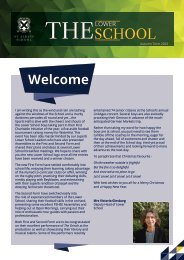You also want an ePaper? Increase the reach of your titles
YUMPU automatically turns print PDFs into web optimized ePapers that Google loves.
Mathematics and Economics<br />
71<br />
who wish to work to earn accordingly<br />
above that level. Modern UBI-ers, such as<br />
author Annie Lowry, point out that this<br />
decision not to work, beyond being a supposed<br />
individual right, would be beneficial<br />
as people can spend more time doing<br />
social activities such as spending time<br />
with dependents, learning a new skill, and<br />
doing voluntary work.<br />
<strong>The</strong> 20th century proposition of UBI was<br />
not confined to the Left, however. Two ostensibly<br />
right- wing economists Friedrich<br />
Hayek and Milton Friedman both supported<br />
basic income. Hayek (1899-1992),<br />
the leader of the Austrian<br />
School of economists<br />
and influencer of<br />
the likes of Thatcher,<br />
was an advocate of<br />
what he named ‘a sort<br />
of floor below which<br />
nobody need fall’ ie. a<br />
subsistence level of income.<br />
He believed the<br />
idea was ‘wholly legitimate’<br />
as it seems to be<br />
a ‘protection against a<br />
risk common to all’.<br />
<strong>The</strong> risk he was alluding<br />
to was the boombust<br />
cycle of capitalism<br />
and wars which he<br />
lived through in the<br />
turbulent 20th Century<br />
in Europe. This,<br />
again, relates to the<br />
importance of UBI to<br />
be paid to all rather than just those lower<br />
deciles of the spectrum. Although Hayek<br />
undoubtedly supported basic income in<br />
this way, his work was not extensive on<br />
how it could be funded, which remains<br />
one of the central aspects of opposition to<br />
the programme. This is where Milton<br />
Friedman (1912-2006) joined the party. He<br />
suggested that those unable or even unwilling<br />
to work should, instead of the welfare<br />
system of the day, be given a rebate<br />
or ‘negative income tax’.<br />
Milton Friedman<br />
This would be at the bare subsistence level<br />
in order to encourage people to still work.<br />
Alongside this, other welfare assistance<br />
would be abolished, in part, in order to<br />
pay for this. This model has been integrated<br />
into many current day proposals.<br />
So it is clear to see that, while those who<br />
oppose UBI that are right-wing inclined,<br />
that shake it off simply out of objection to<br />
its left-wing embodiments, should take<br />
note that some of the most influential<br />
thinkers and economists that they take serious<br />
inspiration from were, in different<br />
ways, proponents of some form of basic<br />
income.<br />
<strong>The</strong> debate thereafter<br />
was stimulated by Belgian<br />
political theorist<br />
Phillippe Van Parijs.<br />
He is often seen as the<br />
father of UBI - a misconception<br />
commonly<br />
held as the history of<br />
basic income is clearly<br />
extensive. Universal<br />
Basic Income is certain<br />
to be a growing topic<br />
of debate in future<br />
decades. Pilot programmes<br />
have already<br />
begun around the<br />
world, including in<br />
Finland and California.<br />
As UBI gains momentum<br />
in the years<br />
to come, its opponents,<br />
as well as proponents, would be<br />
wise to take on the lessons of those notable<br />
names to have come before them - including<br />
many not discussed here. Where<br />
commentators purely focus on the economic<br />
minutia of basic income, there is<br />
clearly a wealth of literature on rights and<br />
liberties-based arguments from thinkers<br />
across the political spectrum. <strong>The</strong>se could<br />
be used to bring people over to the cause,<br />
in order to draw the necessary support for<br />
such a radical and fascinating idea.<br />
Will, U6CPAG


















